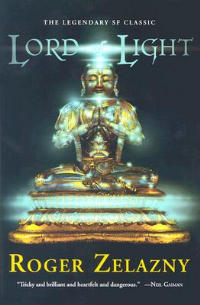 Lord of Light
Lord of Light

Earth is long since dead. On a colony planet, a band of men has gained control of technology, made themselves immortal, and now rules their world as the gods of the Hindu pantheon. Only one dares oppose them: he who was once Siddhartha and is now Mahasamatman. Binder of Demons. Lord of Light.
In the 1960s, Roger Zelazny dazzled the SF world with what seemed to be inexhaustible talent and inventiveness. Lord of Light, his third novel, is his finest book: a science fantasy in which the intricate, colorful mechanisms of Hindu religion, capricious gods, and repeated reincarnations are wittily underpinned by technology. "For six days he had offered many kilowatts of prayer, but the static kept him from being heard On High." The gods are a starship crew who subdued a colony world; developed godlike--though often machine-enhanced--powers during successive lifetimes of mind transfer to new, cloned bodies; and now lord it over descendants of the ship's mere passengers. Their tyranny is opposed by retired god Sam, who mocks the Celestial City, introduces Buddhism to subvert Hindu dogma, allies himself with the planet's native "demons" against Heaven, fights pyrotechnic battles with bizarre troops and weapons, plays dirty with politics and poison, and dies horribly but won't stay dead. It's a huge, lumbering, magical story, told largely in flashback, full of wonderfully ornate language (and one unforgivable pun) that builds up the luminous myth of trickster Sam, Lord of Light. Essential SF reading.
|
|
Signore della luce (Lord of Light, '67)
"Fantacollana" n. 8, ed. Nord, '75, traduzione di Riccardo Valla, (c) '67 by Roger Zelazny, 278 pagine, edizione originale: (Doubleday, '67); |